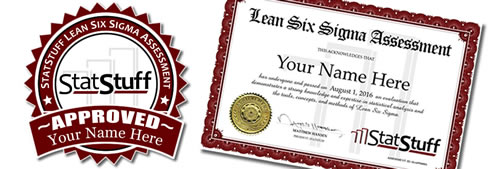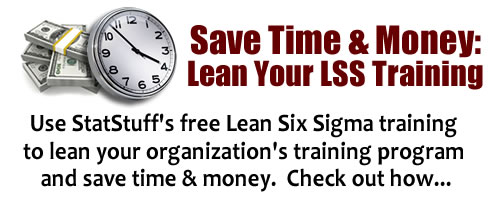There is no central organization governing LSS certifications
 Not many people realize that there is no governing body that centrally grants or manages LSS certifications. Any organization can create their own certification standards as they want. That creates a lot of flexibility but it also causes a lot of variation in the level of skills they are certifying. Many organizations require students to attend classroom training and others grant a certification by requiring the candidate pass an exam and validate they led a LSS-based project. Although this approach is very appealing due to the ease of attaining a certification, it also significantly dilutes the industry with many unskilled "experts" who simply attended some classes and memorized answers to a test. We normally wouldn't use similar methods like that to certify other professionals like doctors, attorneys, CPAs, engineers, plumbers, electricians, etc. - so why should we hold LSS certifications to a lesser standard?
Not many people realize that there is no governing body that centrally grants or manages LSS certifications. Any organization can create their own certification standards as they want. That creates a lot of flexibility but it also causes a lot of variation in the level of skills they are certifying. Many organizations require students to attend classroom training and others grant a certification by requiring the candidate pass an exam and validate they led a LSS-based project. Although this approach is very appealing due to the ease of attaining a certification, it also significantly dilutes the industry with many unskilled "experts" who simply attended some classes and memorized answers to a test. We normally wouldn't use similar methods like that to certify other professionals like doctors, attorneys, CPAs, engineers, plumbers, electricians, etc. - so why should we hold LSS certifications to a lesser standard?
How can I get certified if there's no organization governing LSS certifications?
It's not easy when wading through the many organizations offering LSS certifications since they're all so different. It's first important to understand the three basic steps when getting certified:
- Learn the LSS tools and concepts - There are many great training resources online, in books, in classrooms, etc. No matter where you go to learn about LSS, you can always use StatStuff's training resources as a place to start - after all, it's free!
- Apply the LSS tools and concepts - Most organizations that certify folks don't require this because they simply don't have a sufficient way to test for it. For example, it's easy to test a person's knowledge by taking an exam, but how do you really know if they understand the tools and concepts in such a way to apply it directly to their job or to adapt it to unique circumstances? In this way, having a LSS expert (like a Master Black Belt) mentor you through the application of the tools is the most ideal way to apply them. If you're using StatStuff, then you'll find that each of StatStuff's training videos includes a "Practical Application" section to help further challenge you to apply each lesson.
- Acquire a LSS certification - If you truly applied the LSS tools & concepts, then it should be very easy to get certified. Generally you can get certified by two sources: your employer (through their own LSS program) or a separate training company or institution (like a college). The employer path is usually the most preferred because they more often are led by LSS experts or Master Black Belts who can personally validate your application of the LSS tools and concepts. However, this option is less common and less available to folks not employed by them.
Where do I get certified?
There are many factors to consider when choosing among the many organizations offering LSS certifications. Here are answers to common questions many folks ask when comparing them:
- Do they require me to attend their training?
- Most organizations require students attend their training first. After all, that's where they make their money. This is most common in separate training institutions or colleges. The two most well known organizations that don't require students to attend their training are ASQ and IASSC.
- Do they validate my application of the LSS tools?
- Most certifying organizations will say they do by requiring you to complete a LSS project or to sign an affidavit confirming you had completed such a project. However, this is not a very stringent method and many unscrupulous folks have skirted this requirement by submitting false information. When all other options are equal, it's better to go with an organization that will validate your true application of the LSS tools. Apart from that, you should do your own due diligence to ensure you applied what you learned (such as asking a LSS expert to review your skills directly).
- Do they offer online or classroom training options?
- This will depend on your learning preference. Some people prefer a classroom environment, but that will also limit your options for where and when you can attend the training. Online training can be just as effective and yet offer much more flexibility for your schedule and accessibility to better LSS trainers and experts. No matter which method you choose, you should still supplement your training with additional learning resources, such as the free training from StatStuff.
- How much do they cost?
- The more specialized or recognized the training organization, the more the cost will be. As well, classroom training tends to cost much more too. A higher cost does not always imply better quality (otherwise that doesn't say much for StatStuff's free training resources). If cost and convenience are a high concern, then use the free StatStuff training resources and pursue a certification through ASQ or IASSC. Otherwise, there are many other great (and costly) options to choose from.
- Do they offer many different types of certifications in LSS?
- Some training organizations offer a wide variety of certifications for Lean, Six Sigma, LSS, or even different "flavors" that specialize in certain industries like Finance, Government, Healthcare, etc. LSS is the blending of Lean and Six Sigma, so there's not much you gain by splitting them into separate certifications (after all, Lean doesn't even have a certification in the same way that Six Sigma does). As well, remember that the LSS tools and concepts can be adapted to any business in any industry so specializing in one may actually limit you from learning what you need to adapt it in a general way. So when choosing between certifications, always choose the most generic and most blended, namely, a LSS certification.
- What is the reputation of the organization in the LSS community?
- Actually, this doesn't matter much. If you're looking to get certified to help your career growth, then a certification may get you the interview but successful application of the LSS tools/concepts will get you the job. So don't let the name or supposed reputation of the training organization influence your decision as much as what you can learn from them and how you can apply it toward building your personal portfolio of success in LSS.
- How long does it take to get certified?
- Generally, it should take at least one to two years. Although formal training classes may take far less time, passing a training class is not sufficient proof of a person's LSS skillset. A certification is intended to validate a person's expertise; that expertise requires time to apply the tools in a variety of ways. There is no fast path to expertise that is based on experience. Avoid any training organization that advertises that kind of fast path to certification; their certification isn't worth the paper it's printed on.
- What color "belts" do they offer?
- The most common certification levels are Black Belt and Green Belt. Yellow Belt and Master Black Belt certifications are less common but tend to vary in usage at different organizations. Any other kind of belt (no matter what the color or cheesy title) will not be well known in the LSS community and should be avoided.

Certification Assessments
With all the confusion around LSS certifications, how can an expert in LSS stand out among the many unqualified and inexperienced people getting certified in LSS? It certainly isn't easy, especially when so many recruiters or managers looking to hire someone with LSS expertise don't realize that a LSS certification doesn't truly validate the candidate's expertise in LSS. The best way you can let your LSS expertise stand out is to have many examples of how you successfully led projects by applying LSS. Another way is to get a 3rd party assessment by an independent organization that can validate your LSS expertise. StatStuff is among the first to offer such an assessment; you can learn more about it from this article "Before You Hire A Black Belt..."
For further information about LSS certifications or the different LSS roles, feel free to check out the video "Key Roles in a Lean or Six Sigma Project". For a list of organizations that train and certify in LSS, check out our Training Organizations resource; the list includes many details about what these organizations offer including the types of training, costs, certification requirements, etc. - you can easily compare these options between the organizations.
About StatStuff
StatStuff is the only FREE source for complete Lean Six Sigma training. It is highly endorsed as quality Lean Six Sigma training from leaders at top companies like Apple, eBay, Pepsico, Bank of America, Dell, Sprint, BP, etc. Many other training organizations offer similar LSS training content for $2,000 - $7,000 and their training lasts 40 to 200 hours long. StatStuff’s free online training content is less than 28 hours – plus StatStuff offers Beginner and Intermediate training paths that can be completed in far less time. Many companies, training organizations, and universities are using StatStuff for their training curriculum. And why shouldn't they? There’s no risk, it’s less time, less money, and what better way is there to teach Lean Six Sigma than to apply Lean Six Sigma to their own training plan?



